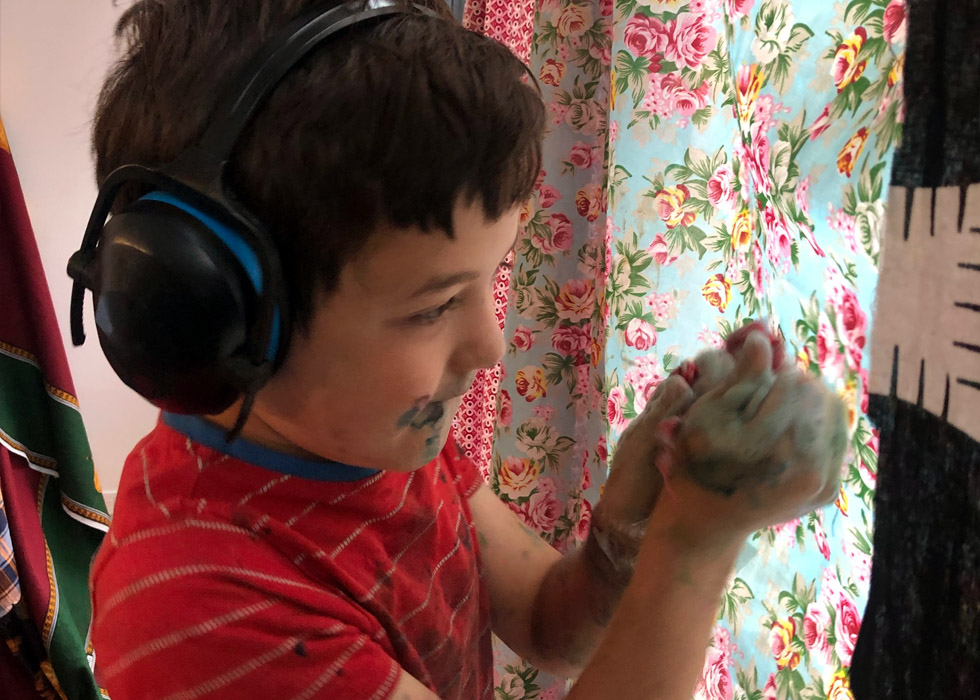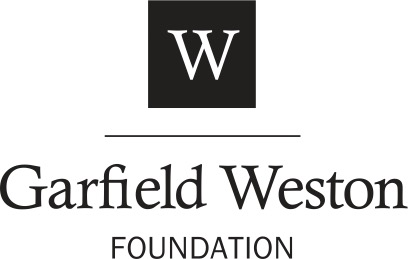In May 2019 Autograph launched its Family SEND programme, offering creative workshops to families with a child/children with complex needs or SEND (special educational needs and disabilities). The programme is just one of many outcomes of Autograph’s ongoing involvement in the radical UK-wide EXPLORERS project, highlighting the extraordinary contribution neurodiverse people make to art and culture. In the years since the launch - and with thanks to funding from City Bridge Trust - we have doubled our workshop capacity to better meet demand, and outmanoeuvred the pandemic by repurposing the programme during lockdown, to deliver 80 art kits to families across London. Earlier this year, we celebrated the third birthday of the programme with families invited to come together to play, create, eat and dance.
Here, lead artist Katriona Beales talks about the programme with Livvy Murdoch - Autograph’s Learning and Participation Manager.
Livvy Murdoch (LM): You’ve been working as the lead artist on Autograph’s Family SEND programme since it was established in May 2019. We’ve worked together through heatwaves, meltdowns, lockdowns and we’ve come out the other side! What is your main learning from working on the programme?
Katriona Beales (KB): We’ve certainly weathered some major global challenges together. The pandemic did turn everything on its head. Our programme went from regular in-person sessions to resource packs sent out to families so they could do art activities together at home. Due to some of the access requirements we work with, online Zoom sessions just weren’t practical. But in a very real sense many of our families were already dealing with crises caused by discrimination and the lack of respite care, while also having to navigate the complex labyrinths necessary to get appropriate support for their child from overstretched health and education services etc. I think the main learning I have gained is how much need there is for truly accessible arts programming that’s inclusive and non-judgemental. I constantly see evidence of how resilient people are and simultaneously how much we need each other. One of the things I am proudest of is that the programme creates a space for informal parent-to-parent peer support.
LM: For those who aren’t familiar with the Family SEND workshops, how would you describe them in three words?
KB: TBC - Totally Brilliant Chaos.
LM: The workshops draw on your personal artistic practice: you plan and design the activities, but we also take care to leave space for the unknown, for new and different responses to stimuli and materials in the room, and to give some freedom and flexibility to the programme. Can you explain this way of working in a bit more detail?
KB: I very deliberately set out to not create sessions that focus on fixed outcomes… you know those art workshops where everything is about recreating a scale model of a certain sculpture? I’m not interested in that. Instead I was thinking about the way I function in my studio, where I often have different things in various stages of making set up around the space. A kind of wheel of options, so that when one thing starts getting frustrating I can pick up another. So I was thinking about having different stations where people can pick up things mid-flow.
I’m also aware of providing creative ideas that don’t require a lot of verbal explanation and instruction, instead creating space for people to respond to the materiality of things - material prompts, if you like. I don’t want to set up tasks that are intrinsically ableist (in demanding certain fine motor skills for example) so instead we create a series of provocations that can be explored in very different ways by different individuals. I suppose it’s a methodology of making-alongside-together. It’s inherently a bit chaotic and also disrupts the usual hierarchies of these things, but it’s extremely important, as it means there is a lot of space for people’s own ways of being and expressing themselves. That openness can be a bit disarming at first and our job in the sessions is to hold the awkwardness of the ‘I-don’t-know-what-to-do’ phase at the beginning, to enable the next stage of following the lead of the child into something. It’s a process that defies most expectations.
In this context we might end the session with nothing that can tangibly be identified as ‘a finished product’ because the thing we were working on has been on such a journey of making and unmaking. So within the programme we measure success in terms of enjoyment and engagement with the process. What has held people’s attention? And how can we build on that for the next session?

"I think the main learning I have gained is how much need there is for truly accessible arts programming that’s inclusive and non-judgemental."

LM: Exactly, the learning goes both ways. So your artistic practice informs the workshops, but how has the programme had an impact on your personal practice and ways of working?
KB: It’s affected me quite deeply. I definitely centre enjoyment and engagement more in my own making now. And in that sense it’s quite liberating, radical and a little revolutionary. So many things become about the outcome, the finish and ultimately the market. The art world can be very reductive. But the Family SEND programme keeps reiterating to me the importance of making things that are more difficult to reduce - the messiness of being and also the joy of it. And in that sense I find it quite restorative as an artist.
LM: The workshops centre the needs and experiences of children with complex needs, but they are designed to be welcoming and collaborative spaces for siblings, parents, carers and extended family - what does that mean, in a practical sense?
KB: Yes we really wanted it to be a space where the whole family could participate together, where acts of co-creation can happen and the distinctions between disabled and non-disabled siblings are reduced. This acknowledges that these spaces are rare and that mostly, these distinctions are enforced by ableist environments and attitudes. We want to create a level playing field where everyone can participate and everything is valued. Practically, this can be quite complicated. It means trying to open up a making space that is multi-layered and maybe less definable, space that is capable of holding the interests of a very diverse group. Essentially, it’s about giving people the opportunity, tools and confidence to have a go at something that they may not already be familiar with and create a child-led space where we can all be playful and experimental. We encourage adults not to spectate but to dive into the making process. Children mostly get straight on it.
LM: The programme places the social model of disability at its heart, and is situated within Autograph’s wider rights-based framework and mission to explore identity, representation and social justice issues through art and creativity. Do you think these politics are important to the shape and feel of the programme?
KB: I think they are essential. I’m very interested in the Reggio Emilia idea of ‘special rights’ rather than special needs. That notion really turns a lot of the wider discourse about SEND on its head - rather than thinking about ‘accommodating’ people with complex needs it’s much more activist and celebratory. I think there is a political imperative in creating space and committing time to celebrating the cultural lives and creative expressions of families with complex needs. A lot of what Autograph does and has done so well historically is about giving cultural space for underrepresented voices. And the Family SEND programme fits in perfectly with that wider mission.
LM: Finally, what’s your most memorable moment from the programme?
KB: I honestly have so many. I loved our recent third birthday celebration. Getting so many people together after so long to have a really good time was pretty mega. Sometimes celebrations are acts of defiance too. And it also gave me the excuse to make a turquoise and gold child-sized swan float, just because.

Autograph's programme of free artist-led workshops for families who have a child/children with complex needs or SEND (special educational needs and disabilities).
Find out moreCan you spare a few moments? Autograph is carrying out a survey to better understand who our digital audiences are. The survey should take no longer than five minutes to complete. Anything you tell us will be kept confidential, is anonymous and will only be used for research purposes.
The information you provide will be held by Autograph and The Audience Agency, who are running the survey on our behalf. In compliance with GDPR, your data will be stored securely and will only be used for the purposes it was given.
You can take the survey here. Thank you!


All images are from Family SEND Programme workshops, with thanks to the attendees.
Autograph is a space to see things differently. Since 1988, we have championed photography that explores issues of race, identity, representation, human rights and social justice, sharing how photographs reflect lived experiences and shape our understanding of ourselves and others.